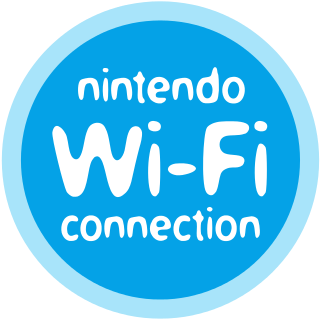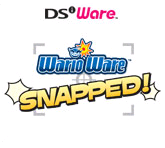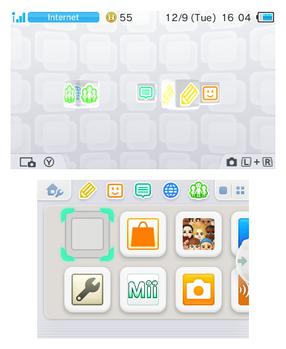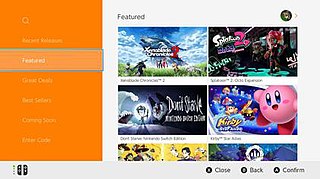
Electroplankton is an interactive music video game developed by indieszero and published by Nintendo for the Nintendo DS handheld video game console. It was first released in Japan in 2005, and was later released in North America and Europe in 2006. This game allows the player to interact with animated plankton and create music through one of ten different plankton themed interfaces. The first edition of Electroplankton in Japan is bundled with a set of blue colored ear bud headphones.

Nintendo Wi-Fi Connection was an online multiplayer gaming service run by Nintendo that formerly provided free online play in compatible Nintendo DS and Wii games. The service included the company's Wii Shop Channel and DSi Shop game download services. It also ran features for the Wii and Nintendo DS systems.

The Wii Shop Channel is a discontinued digital distribution service for the Wii video game console. The service allowed users to purchase and play additional software for the Wii, including exclusive games, and games from prior generations of video games. The Wii Shop Channel launched on November 19, 2006, and ceased operations on January 30, 2019.

The Classic Controller is a game controller produced by Nintendo for the Wii home video game console. While it later featured some compatibility with the Wii U console, the controller was ultimately succeeded by the Wii U Pro Controller. In April 2014, Nintendo discontinued production of both the Classic Controller and Classic Controller Pro.

Teyon S.A. is a Polish video games developer, producer, and publisher. Founded in 2006, the company has two offices in Poland and one in Tokyo, Japan, with three development teams.

The Wii system software is a discontinued set of updatable firmware versions and a software frontend on the Wii home video game console. Updates, which could be downloaded over the Internet or read from a game disc, allowed Nintendo to add additional features and software, as well as to patch security vulnerabilities used by users to load homebrew software. When a new update became available, Nintendo sent a message to the Wii Message Board of Internet-connected systems notifying them of the available update.
Downloadable content (DLC) is additional content created for an already released video game, distributed through the Internet by the game's publisher. It can either be added for no extra cost or it can be a form of video game monetization, enabling the publisher to gain additional revenue from a title after it has been purchased, often using some type of microtransaction system.

The Nintendo DSi is a dual-screen handheld game console released by Nintendo. The console launched in Japan on November 1, 2008, and worldwide beginning in April 2009. It is the third iteration of the Nintendo DS, and its primary market rival was Sony's PlayStation Portable (PSP). The fourth iteration, entitled Nintendo DSi XL, is a larger model that launched in Japan on November 21, 2009, and worldwide beginning in March 2010. Development of the DSi began in late 2006, and the handheld was unveiled during an October 2008 Nintendo conference in Tokyo. Consumer demand convinced Nintendo to produce a slimmer handheld with larger screens than the DS Lite. Consequently, Nintendo removed the Game Boy Advance (GBA) cartridge slot to improve portability without sacrificing durability.

Sudoku Challenge! is a WiiWare sudoku game developed by Digital Leisure. The game was released in North America on November 24, 2008 and in the PAL region on December 19, 2008 and costs 500 Wii Points. The DSiWare version has been released in North America on November 30, 2009 and in the PAL region on May 14, 2010.

WarioWare: Snapped! is a minigame compilation party video game developed by Nintendo SPD Group No.1 and Intelligent Systems and published by Nintendo for the Nintendo DSi's DSiWare digital distribution service, and is part of the WarioWare series of video games. It is the sixth game in the series.

Brain Age Express are three educational puzzle video games developed by Nintendo for the Nintendo DSi's DSiWare download service. They are the third series of games in the Brain Age series, and are repackaged versions of both Brain Age: Train Your Brain in Minutes a Day! and Brain Age 2: More Training in Minutes a Day! games, featuring both old and new puzzles.

The Nintendo DSi system software is a discontinued set of updatable firmware versions, and a software frontend on the Nintendo DSi video game console. Updates, which are downloaded via the system's Internet connection, allow Nintendo to add and remove features and software. All updates also include all changes from previous updates.

Karaoke Joysound (カラオケJOYSOUND) is a karaoke service and online song library from Japanese karaoke service provider Xing. The Joysound service, which started on various karaoke computers, was adapted into a video game by Hudson Soft for Wii, licensing the Joysound online song library alongside Xing, who also helped co-develop the game with Hudson. The game was originally released in a retail package with an included USB microphone on December 18, 2008 in Japan, and was later released there as a downloadable WiiWare game on July 28, 2009.

The Nintendo 3DS system software is an updatable operating system used for the Nintendo 3DS handheld system. The Nintendo Switch system software is believed to have evolved from the Nintendo 3DS operating system.

The Nintendo eShop is a digital distribution service for the Nintendo Switch, and formerly available via the Nintendo Network for the Wii U and Nintendo 3DS. The Nintendo eShop was first launched in June 2011 on the Nintendo 3DS via a system update that added the functionality to the HOME Menu. It is the successor to both the Wii Shop Channel and DSi Shop. Unlike on the Nintendo 3DS, the eShop was made available on the launch date of the Wii U, although a system update is required in order to access it. It is also a multitasking application, which means it is easily accessible even when a game is already running in the background through the system software, though this feature is exclusive to the Wii U and the Nintendo Switch. The Nintendo eShop features downloadable games, demos, applications, streaming videos, consumer rating feedback, and other information on upcoming game releases.

The Wii U operating system also known internally as Cafe OS is the official firmware version and system software for the Nintendo's Wii U home video game console. Nintendo maintains the Wii U's systemwide features and applications by offering system software updates via the Internet. Updates are optional to each console owner, but may be required in order to retain interoperability with Nintendo's online services. Each update is cumulative, including all changes from previous updates.

Wii Karaoke U by Joysound was a karaoke video game for the Wii U eShop. It was developed by TOSE Software and published by Nintendo. The game was a successor to the Wii game Karaoke Joysound, licensing the same Joysound online song library. The game was free to download but requires the purchase of a karaoke ticket to sing songs, as well as an internet connection.















